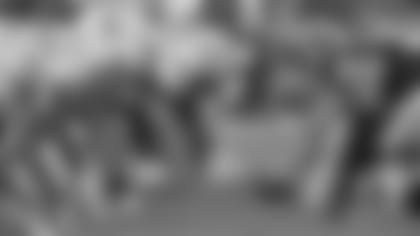Q: What challenges does the Miami defense present in terms of their personnel and scheme?
JM: This is a very active group. They play a lot of people in the front, they rotate seven players in there consistently up front, and they have a really good pass rush. They don't need to pressure to create issues in terms of trying to get to the quarterback. They've got multiple guys that can come after the quarterback on the edge and that have already made negative plays and created some third-and-long type situations, which they do a great job of. They did a great job of that last year, of creating a lot of third-and-longs by creating negative plays, and they've started to do the same thing this year. They have a little bit of certainly the Cincinnati style that we saw a few weeks ago, not exactly the same, but there are definitely some elements there with the fact that the coordinators worked together and came from the same kind of a system. There are definitely some challenges with some of their blitz packages – they bring their secondary players maybe more than some of the teams that we've faced this season, so we're going to have to do a good job of being ready to handle that. This is a team that creates negative plays and forces turnovers in a lot of different ways, and we certainly had two difficult games against them last year. I know we created a little bit of space in the game that we played against them last year at home, but they have a lot of new players too: [Dannell] Ellerbe and [Philip] Wheeler, and [Dion] Jordan, the draft pick, and [Brent] Grimes. I mean, this is a little bit of a different defense in terms of their overall personnel from what it was last year, but I think it's a great challenge. They're really an active group that plays fast, they're very physical up front, and this will be a huge test for us on Sunday.
Q: I know players get grades after games, but how do you get reviewed after a game? Specifically after the last game, what did you take away from that and how were you reviewed?
JM: We certainly look at everything that happened during the course of the game, things we could have done differently, things that – maybe adjustments that might have been productive for you during the course of the game, and then, certainly each game is different, but you always have a plan with what you want to do each week. Sometimes you're fortunate that you can carry that all the way through the game without needing to change directions and make some significant adjustments, and other times you don't. I think that we certainly started the game the way that we wanted to do it, and then had a definite lull there between the end of the second quarter and the beginning of the second half. The third quarter has been an area that we haven't done very well in, and we're going to need to certainly focus a lot of our attention on that, and come out and have a good idea of what we want to do and execute our offense the same way in the third quarter that we try to do in every other quarter. So that was something that we didn't do as well as we wanted to, and I've got to do a better job of trying to put us in positions to make some plays coming out of halftime.
Q: It seems like it went from 21-10 to 24-21 really quickly in the third quarter. Is there any rhyme or reason or similarities that you can see as to why you've been sluggish coming out of the gate in the second half?
JM: I don't think there's been one consistent theme. I think that there's no magic formula for any team to come out and do well, whether that's the beginning of the game or the third quarter. I'd love to say that there's a personnel grouping or a style of play or certain types of play calls that could insure us a certain level of success, but I don't really believe that that's the case. There's certainly things we can call, and we can maybe have ready to go or make an adjustment and try to come out and take advantage of something that we saw in the first half and do better in that area. That's really where my focus is going to be. I know ultimately whatever we choose to do, we've got to put our guys in a position where they can execute and succeed, so I think we've just got to keep grinding away at. It's not for lack of effort on anybody's part, and I think that we'll definitely take a look at everything we've done and try to improve in every area, including the beginning of the second half.
Q: When you watch the game film, do you see the opponent changing a lot and making adjustments in the second half that might take you a little bit of time to figure out or get used to?
JM: I think every team, including ourselves, makes some adjustments at halftime to things that may have either hurt them in the first half, or makes an adjustment to something that they see that they may be able to take advantage of in the second half. I think our process has really been the same in terms of trying to look at what we've done, what the defense has played us like, what their calls by personnel or situation may be, and try to make sure that we put out a game plan for the second half, just like we do in the first half, accordingly. Some teams make a lot of adjustments, some teams don't, and I don't believe Sunday was a situation where there were a lot of dramatic changes in the third quarter. We've just got to find a way to play better.
Q: Can you talk about the play of Rob Gronkowski on Sunday? You obviously targeted him a lot of times. Was that Tom Brady just recognizing that he was consistently getting open, or was it part of the game plan that he was good to go and be the leading receiving option?
JM: I think Gronk [Rob Gronkowski] certainly gave us production and helped us in many ways on Sunday. [He] definitely didn't play the whole game by a long stretch, and [we] tried to spot him in there when we felt like he could help us be most effective. In many cases that was third down or two-minute or a few times in the fringe of the red zone where it was a situation where we were more likely to throw the ball. He was in there on some runs also, but it just seemed like that was the way we chose to use him. I think the fact that he was targeted, whatever number of times it was, I think it's just more of a by-product of the fact that he maybe had some single-coverage and had an opportunity to get open and created some separation, and Tom found him.
Q: Obviously it must be nice to have him back in the mix.
JM: Yeah, I mean certainly he's an impact player, and any time you have guys like that that are out and you're fortunate enough to get back, they certainly make a difference and give your team a boost, and I thought he did that on Sunday. Hopefully we'll be able to build on that going forward.
Q: It seems like third-and-long is more of a roll of the dice, and I think you were 1-for-5 on on Sunday with anything third-and-five or less. Are the third-and-short situations the ones where you really have to produce?
JM: I think that's really how third down goes. You work so hard on first and second down to try to put yourself in a position that if it is third down that you're faced with, that it's third and shorter. Certainly the lower the distance, the better chance you have of converting because you don't need to hold up in protection as long, you don't face as many different looks or difficult types of blitzes, you have more things at your disposal: you can run the ball, you can throw it short, you can throw it intermediate, you can use five guys out in the formation, whatever it may be. So third-and-shorters are definitely what we want to play the game in. We certainly didn't convert enough of those opportunities in any distance on Sunday, and when you find yourself in as many third-and-longs as we were in on Sunday, that's definitely a formula for getting knocked off the field too many times, and having too many three-and-outs and short series and forcing the defense to go back out on the field. Third down, third quarter, two big areas of focus for us as we go forward, and we've got to improve on those things and we're going to do everything we can to try to make those areas of strength as we go forward.
Q: You've often described your offense as a game plan offense that changes from week to week. Keeping in mind that you need to have some semblance of balance between the run and the pass, do you feel like you're running the ball enough?
JM: We always want to maintain our balance, and so whenever we get too far off of that balanced number in terms of run/pass, it's definitely not something that we're looking many times to do. Now, sometimes the situation in the game may dictate that you throw it more at the end, because you're in two-minute type mode or whatever it that may be, that can take you out of a few of those things as you go. We chose to start the game the other day with more of a no-huddle, up-tempo passing approach, and so that always can kind of skew it as well. But no, we're never trying to get too far out of balance on that. We definitely need to hand the ball to our backs, and that's definitely going to be something that we want to do each week. If I haven't done enough of that, then certainly we're going to try to make sure that we go into each game with a good plan and give all of our skill players an opportunity to make an impact in the game, definitely including the backs.







































